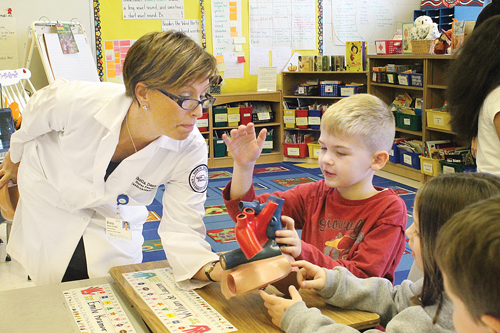Guest Spot: Five simple ways to better support kids at home

There has been a great deal of press about the Common Core curriculum, testing and what schools will and won’t be doing to improve the education system. News-Review editor Michael White’s column raised some excellent points and concerns about whether these efforts will actually help all children.

As a retired teacher and grandparent, I am concerned. What can teachers, parents and caregivers do while the decision makers plan their next move? We must preserve the curiosity and love for learning that our children have at birth and not lose or stifle these traits in the scuffle.
I have spent the last seven years, reading, tutoring, meeting with teachers and creating I Can Do That! Kids, a web and printed resource that helps children stay motivated and excited about learning. I have found that there are some simple, proven ways to help children stay energized, persevere and achieve their “personal best” — even as schools raise the bar.
We read “The Little Engine That Could” to a child when they are very young to inspire them to say, “I think I can, I think I can” when faced with a challenge. As they grow up they need to learn, “How I can! How I can!” strategies and actions to work at something difficult.
There are some easy ways parents and caregivers can help children know what to think, say or do when faced with a challenge. Put aside the back-to-school ads. Here’s a different way to get your child “ready for school” with these five tips.
1. Talk about “hard stuff” — challenges. Ask your child to tell you about something difficult that they recently accomplished. Explain that kids have to do lots of “hard stuff,” called challenges. Obstacle courses are a challenge, but are fun. Video games are challenging and that’s why kids love playing them. Make the connection that doing “hard stuff” is really like an obstacle course or a video game and rather than think, “Oh no, this is too hard!” think, or say, “This is a challenge that I can’t do … yet!”
2. Break it down. “There’s too much to do.” Help a child work at a challenge by starting with a small, doable piece. Think of it as a large puzzle with pieces that need to be assembled. When they have a page of math problems to solve that seems overwhelming, get a blank sheet of paper. Say, “Find the one that you think is the easiest to begin with”, and then cover the others. Help them focus on just one piece of an assignment at a time.
3. Increase ‘think time.’ Don’t jump in too quickly when you hear, “I don’t remember what to do.” Provide them with time to stop and think. Suggest that they look for clues or ask them to explain what they are unsure about. Delay giving them hints or information until you are certain that they have exhausted their resources. You will be providing an opportunity for them to think for themselves and to realize what they are capable of achieving.
4. Making mistakes is good! The surest way to succeeding is by working through mistakes. We tend to make a very big deal about achievements and not enough emphasis is put on the fact that mistakes will happen. It’s normal; everyone makes mistakes and they actually help us get very good at something! Mention the most recent mistake you have made, how it felt and what you did to eventually succeed.
5. Use ‘process praise.’ Acknowledge how your child is achieving, rather than just the achievement. For example, say, “That was a lot of work. I really like the way you stuck to it and didn’t give up!” Or, “You finished your homework and I’m impressed that you didn’t let anything distract you from getting it done!” Research has proven that children who are praised for how they accomplish a task build confidence quicker and are more willing to take on difficult tasks that come their way.
These are a few ways to build a child’s feeling of “I am capable!” Post this column on the fridge. Remember and use these tips. When a child comes home from school, you may find yourself on automatic pilot, saying or doing what you have in the past to help motivate them. These tips will provide you with an opportunity to do something different and perhaps challenging. It means you will experience what your child is experiencing.
Southold resident Angelo Truglio is an education consultant, music educator and founder of www.icandothatkids.com. Follow Mr. Truglio’s postings at www.angelotruglio.com. He can be reached at [email protected] or 631-765-8033.








